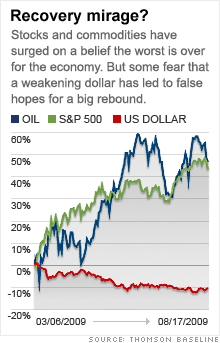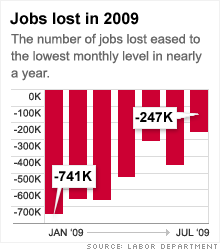Beware the double dip
There are growing fears that talk of a recovery is a Wall Street illusion and that the economy could dip into recession again if the job market doesn't improve soon.



NEW YORK (CNNMoney.com) -- There is a growing sense that the current recession is over. Too bad there are already worries about the next one.
It's a phenomenon economists refer to as a double dip -- and it's just as unsavory as the chip-eating practice of the same name that got George Costanza in a heap of trouble.
A double-dip recession is a downturn that technically ends, but is followed by a fleeting period of growth and another period of economic declines.
This last happened nearly three decades ago, with the economy coming out of a minor recession in early 1980 only to be followed by a far more pronounced downturn that lasted from the middle of 1981 throughout the end of 1982.
Of course, things are a bit different from the early 1980s. This recession can hardly be considered minor. So if growth resumes later this year, it's tough to imagine how the dip would be worse than the initial plunge.
That said, the cause of another double dip could be similar. Inflation.
While the explosive stock market rally since early March has fueled hopes that the worst is really over and that the economy is no longer on the brink of a prolonged deep plunge, some argue that the rally is an illusion fed by interest rates near zero percent, a weaker dollar and rising commodity prices.
"The recovery is based on the destruction of the currency. As the dollar goes down, everything priced in dollars goes up," said Michael Pento, chief economist with Delta Global Advisors, Inc., a money management firm.
The greenback has fallen about 10% against a basket of currencies since stocks bottomed in early March. At the same time, the price of oil is up almost 50%. Soybean prices are up nearly 25% while sugar futures have surged nearly 65%. And the price of copper has skyrocketed about 75%.
If that trend continues, it's possible that these price increases will eventually be passed on to you and me. That could prompt the Federal Reserve to jack up interest rates in an attempt to cool off inflation.
So any recovery that takes place later this year could quickly fizzle if rising prices lead to more pain for consumers that result from sticker shock and higher interest rates.
"Inflation could skyrocket by the end of the year. That could force the Fed to raise interest rates and send the economy into a double dip recession in 2010," Pento said.
Not everyone thinks that inflation is going to rear its ugly head again. Sean Snaith, director of the Institute for Economic Competitiveness at the University of Central Florida in Orlando, argued that it's hard to envision "Zimbabwe-style hyperinflation" -- that African nation was forced to issue a 100 trillion dollar note earlier this year -- as long as the job market is weak and wages aren't rising.
But at the same time, continued woes in the job market could be enough of a problem to lead to another downturn. Even though the number of jobs lost in July came in far lower than economists' estimates, it's foolish to try and argue that the loss of 247,000 jobs in one month is a good thing.
What's more, the unemployment rate -- at 9.4% -- remains near a quarter-century high. So even if consumers do what they usually do in the second half of the year and spend a bit more due to the back to school and holiday seasons, a pickup may be temporary.
"We're in the camp that thinks the recession is over but with a big asterisk. The recovery won't feel like one for consumers and there is still a significant risk of a double dip," said Sal Guatieri, senior economist with BMO Capital Markets in Toronto.
Snaith agreed.
"When you're talking about unemployment near the double digits, that can cause a dent in consumer behavior. Without robust spending it's hard to get the economy overheating."
He finds it hard to imagine how a recovery, or the market surge of the past five months, can be sustained unless companies start hiring again in the near future.
"I call it the genie's lamp recovery. We're all going to be rubbing one and wishing for stronger job growth," Snaith said. "The rally has been based on the dissipation of fear and panic. Just moving beyond that felt good. But the economy still faces a long climb out of this hole."
Guatieri added that as long as unemployment is a problem, that's likely to lead to more mortgage defaults -- both from consumers and businesses. That's obviously not good news for people who believe the real estate market has finally made a turn for the better. Or for those betting that banks are out of the woods in terms of problems with bad loans on their books.
"We're in for a long slog towards a resumption of normal economic growth," he said. "There is a possibility that consumers backslide because of lingering joblessness. Foreclosures are still at record highs and the commercial real estate market is under a lot of stress."
The good news is that if consumers continue to save more and spend less, that decreases the chances of another credit bubble down the road.
it's better to have a gradual upward trend in savings. That is more likely to lead to a longer lasting recovery. A build up in debt and spending could give us a short-term booster shot, but we could be back in the same mess in two years.
But Pento worries that despite the best intentions of consumers, the massive amount of government spending designed to stimulate the economy will only lead to rising debt levels that could cripple the economy in the future.
"The recovery is artificial, Record low interest rates and stimulus pulling demand forward," he said. "But what engendered the crisis to begin with was an unsustainable level of debt. We haven't healed anything."
Talkback: Do you think the recession is over? If so, are you worried about a double dip next year? Add your comment below. ![]()

